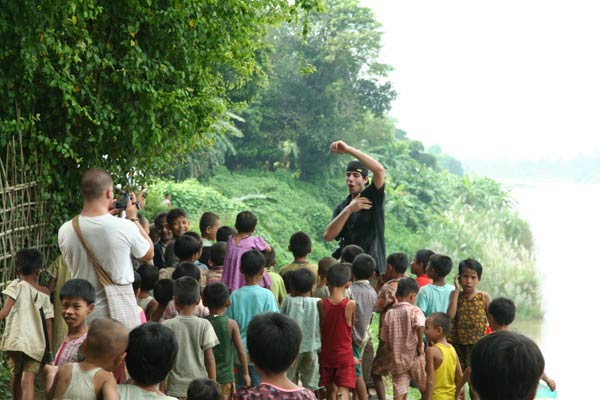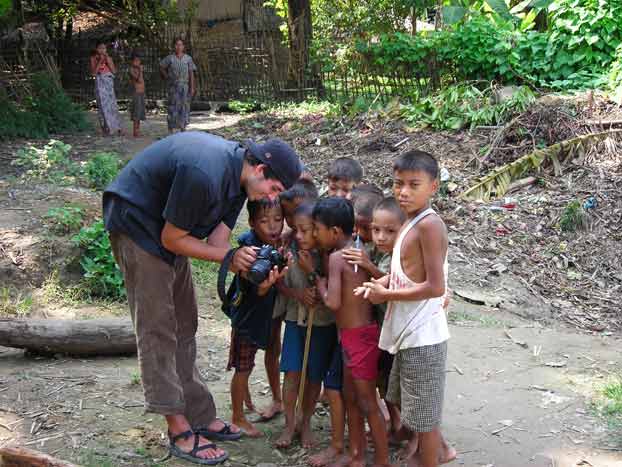Semester at
Sea Fall
2006 Voyage 
TABLE
OF CONTENTS
Crossing the Globe: The World
is
a Playground of Endless Knowledge

By Evan Kleiman
Traveling around the world has allowed me not just to be knowledgeable but also first handedly to understand about the heightened interconnectivity of people around the world and the degree to which transnationalism has blurred the borders between countries.
I have been exposed to some of the many drastic social, political and economic impacts that transnationalism has had on people all around the world. Between the advancements of telecommunications, immigration and rapidly advancing globalization, the vernacular aspects of each country more and more everyday are challenged and threatened in such a huge manner. So much so that it has become increasingly difficult from country to country to even differentiate between what is transnational and what is vernacular. To some, this phenomena that is hurting the vernacular but fueling the transnational business world, is a dream. The extent to which transnationalism continues to flourish in the world, even in civilizations that date back thousands of years, is measured by a piece of paper indicating their successes, not by social effect on the native people. The transnational world has spread throughout the streets of India, Turkey, Egypt, etc. The world is becoming smaller and smaller every day.
This overwhelming process, essentially, can be compared with the effects of war. Yet in the case of Croatians and Burmese, those being fought for the most part are helpless, because the money (amunitions) if you will is much stronger than the masses. This fight for vernacular preservation becomes more and more difficult every day.
In relation to the comparisons and contrasts of the transnational and the vernacular and the relationships to the consequences of war and an oppressive military regime and how they are very different yet in many ways very similar, Croatia and Burma are two countries that seemed enticing to examine.
The following is a link to the Global Cities paper on Burma:
Where the Heart Is
The following is a link to the Global Cities paper on Croatia:
Magical Land
Dubrovnik’s preservation of the vernacular has in many ways been devastated by the recent war and the result of the strong foreign influence and presence in the reconstruction of Dubrovnik, Croatia. The destruction of the city from the war has caused it to essentially be re-built. Thus it is especially difficult to differentiate between the vernacular and transnational aspects of the city. Since the war, the re-building process has in many ways been geared towards the potential capitalistic opportunities and gain of building a hot spot for tourism, so that people all over the world could come and visit the site of a very recent war. In many ways it has been beneficial, for it has resulted in its magnificently beautiful presence today. The oppressive affects of the aftermath of war can be similarly compared to the oppression of an authoritarian regime in Burma. Although both are completely different, in many ways they are very much the same.
Just as the Croatians were financially helpless after the war to help and establish a strong vernacular presence, the Burmese have been helpless and aggressively oppressed to have influence in the actions of the state, and in the case of this paper, the city of Yangon. The Burmese government essentially controls absolutely everything that is constructed or influenced within the city. This control is similar to the control that maybe not a government had but that money had in allowing the foreign investors to essentially decide the architecture, placement, and aesthetics of the reconstruction plan in Dubrovnik after the war. In Burma, there is a wide variety of buildings, houses, huts, hotels, and they all have been constructed unique to the Burmese influence and illustrate in many ways that of the vernacular. The land is more flat which has allowed the construction to spread out over the lands. Whereas in Croatia, the geographical location has forced the reconstruction to be built up into the hills, around the old city (the last of the vernacular), and around the coast.
On one hand Burma has a very strong vernacular presence, the pagodas, the roads, the buildings, the houses, the temples, restaurants, schools, etc all embody mostly vernacular characteristics. The government controls everything and anything that occurs, hence there is very minimal transnational influence. While on the other hand Dubrovnik’s transnational port has opened its city and country up to the transnational world, and in many ways has catered to the want and desires of tourists from around the world. Its development continues to rapidly evolve.
Although the two countries differ in so many ways there still is such a similarity in maybe not the vernacular/transnational presence, but the means and roads that have been taken to get to where the both countries are the way they are today. The major theme is oppression, lack of control and influence, and distinct but simultaneous difficulties in the differentiation between the vernacular and the transnational.
There are so many factors to take into account in examining what is vernacular and what is transnational, from the consequences of natural disasters, globalization, political influence, social influence, foreign influence, geography, etc. There is such a degree of complexity within both. It is almost as if each country, each city, each piece of land can offer complex study for all of mankind. The transnational and vernacular will be more easily analyzed in the future of each country mainly because even though both countries are very old, the make-up of their cities in the context of this essay is relatively new.
